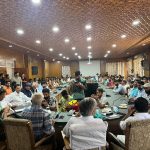As advancements in healthcare and living standards lead to increased life expectancy, a new challenge emerges — the curse of longevity. One of the most formidable foes of aging populations is dementia, a group of disorders characterized by cognitive decline and memory loss. This article delves into the complex issue of dementia, exploring its impact on individuals, families, and societies, and the urgent need for comprehensive strategies to address this growing public health concern.
Understanding Dementia
Dementia is not a specific disease but a term encompassing a range of cognitive disorders, with Alzheimer’s disease being the most common form. Other types include vascular dementia, Lewy body dementia, and frontotemporal dementia. As individuals age, the risk of developing dementia increases, posing a significant threat to cognitive function and overall well-being.
The Burden on Individuals and Families
Dementia not only erodes memory but also impairs a person’s ability to perform daily activities and make sound judgments. This places an immense burden on affected individuals and their families, who often become primary caregivers. The emotional toll, financial strain, and the challenges of providing round-the-clock care contribute to the profound impact of dementia on the quality of life for both patients and their loved ones.
Societal Challenges and Economic Impact
As populations age, the prevalence of dementia is expected to rise dramatically. This demographic shift poses significant challenges for healthcare systems, economies, and societal structures. The economic burden of dementia, including healthcare costs and lost productivity, is staggering. Nations worldwide grapple with the need to allocate resources for research, care, and support services to address this looming crisis.
The Role of Genetics and Lifestyle Factors
While aging is a primary risk factor for dementia, genetics and lifestyle choices also play crucial roles. Individuals with a family history of dementia may be genetically predisposed to the condition. However, lifestyle factors such as diet, physical activity, and cardiovascular health can influence the risk of developing dementia. Addressing modifiable risk factors becomes imperative in the quest to mitigate the impact of dementia.
Challenges in Diagnosis and Treatment
Diagnosing dementia poses challenges as symptoms may be subtle and vary among individuals. Early detection is critical for implementing interventions that can slow down the progression of the disease. Currently, there is no cure for most forms of dementia, making research into effective treatments and preventive measures a priority in the scientific community.
Promoting Brain Health and Research Initiatives
To combat the curse of longevity and the rising tide of dementia, a multi-faceted approach is necessary. This includes promoting brain health through healthy lifestyle choices, fostering research initiatives to understand the complexities of dementia, and developing innovative treatments and interventions. Public awareness campaigns are vital in reducing stigma, encouraging early diagnosis, and enhancing support for affected individuals and their families.
The curse of longevity, in the form of dementia, stands as a formidable challenge that demands immediate attention and concerted efforts from individuals, communities, and government. As we navigate the complexities of an aging population, prioritizing brain health, investing in research, and developing comprehensive care and support systems are essential steps toward alleviating the impact of dementia and fostering a future where longevity is a blessing rather than a curse.
(The Author is Senior Consultant Psychiatrist, Tulasi Healthcare, New Delhi)








